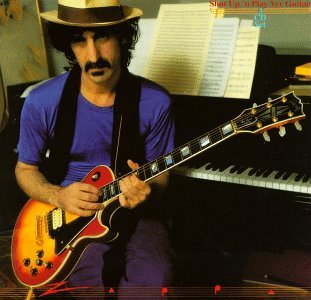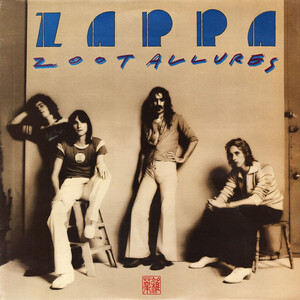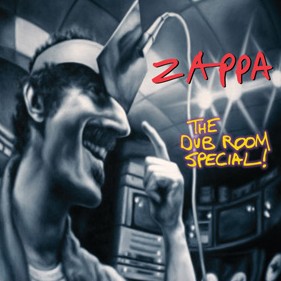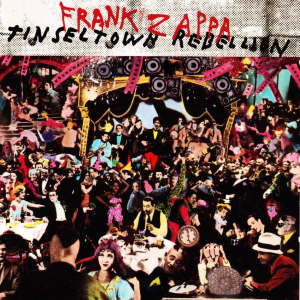Related Research Articles

Frank Vincent Zappa was an American musician, composer, and bandleader. His work is characterized by nonconformity, free-form improvisation, sound experiments, musical virtuosity and satire of American culture. In a career spanning more than 30 years, Zappa composed rock, pop, jazz, jazz fusion, orchestral and musique concrète works, and produced almost all of the 60-plus albums that he released with his band the Mothers of Invention and as a solo artist. Zappa also directed feature-length films and music videos, and designed album covers. He is considered one of the most innovative and stylistically diverse musicians of his generation.

Joe's Garage is a three-part rock opera recorded by American musician Frank Zappa in September and November 1979. Originally released as two separate studio albums on Zappa Records, the project was later remastered and reissued as a triple album box set, Joe's Garage, Acts I, II & III, in 1987. The story is told by a character identified as the "Central Scrutinizer" narrating the story of Joe, an average adolescent male, from Canoga Park, Los Angeles, who forms a garage rock band, has unsatisfying relationships with women, gives all of his money to a government-assisted and insincere religion, explores sexual activities with appliances, and is imprisoned. After being released from prison into a dystopian society in which music itself has been criminalized, he lapses into insanity.

Return to Forever was an American jazz fusion band that was founded by pianist Chick Corea in 1972. The band has had many members, with the only consistent bandmate of Corea's being bassist Stanley Clarke. Along with Weather Report, The Headhunters, and Mahavishnu Orchestra, Return to Forever is often cited as one of the core groups of the jazz-fusion movement of the 1970s. Several musicians, including Clarke, Flora Purim, Airto Moreira and Al Di Meola, came to prominence through their performances on Return to Forever albums.

Them or Us is an album by American musician Frank Zappa, released in October 1984 by Barking Pumpkin Records.

Apostrophe (') is the fifth solo studio album and eighteenth in total by Frank Zappa, released in March 1974 in both stereo and quadraphonic formats. An edited version of its lead-off track, "Don't Eat the Yellow Snow", was the first of Zappa's three Billboard Top 100 hits, ultimately peaking at number 86. The album itself became the biggest commercial success of Zappa's career, reaching number 10 on the US Billboard 200.

Ship Arriving Too Late to Save a Drowning Witch is an album by American musician Frank Zappa, released in May 1982 and digitally remastered in 1991. It features five tracks composed by Zappa, and one song, "Valley Girl", co-written with his daughter, Moon Zappa, then a teen, who provided the spoken monologue mocking Valley girls, including phrases like "Gag me with a spoon!".

Shut Up 'n Play Yer Guitar, a project consisting of Shut Up 'n Play Yer Guitar, Shut Up 'n Play Yer Guitar Some More and Return of the Son of Shut Up 'n Play Yer Guitar, is a series of albums by Frank Zappa. The albums consist solely of electric guitar instrumentals and improvised solos played by Zappa and featuring a wide variety of backing musicians.

Zoot Allures is the 22nd album by the American rock musician Frank Zappa, released in October 1976 and his only release on the Warner Bros. Records label. Due to a lawsuit with his former manager, Herb Cohen, Zappa's recording contract was temporarily reassigned from DiscReet Records to Warner Bros.

Sleep Dirt is an album by Frank Zappa released in January 1979, on his own DiscReet Records label. It reached #175 on the Billboard 200 album chart in the United States.

Strictly Commercial is a compilation album by Frank Zappa. It was released in 1995, two years after his death. The album was named as part of a 2011 lawsuit by Gail Zappa towards Rykodisc, claiming the label released several vault masters without the permission of the Zappa Family Trust on this and other releases, specifically the single edits of some songs, such as the 12" disco Remix of "Dancin' Fool". The disc is currently out of print and has been replaced in Zappa's catalog by the 2016 compilation album ZAPPAtite.

Läther is the sixty-fifth official album by Frank Zappa. It was released posthumously as a three-CD set on Rykodisc in 1996. The album's title is derived from bits of comic dialog that link the songs. Zappa also explained that the name is a joke, based on "common bastardized pronunciation of Germanic syllables by the Swiss."

Zappa in New York is a double live album by Frank Zappa released on his own DiscReet Records label. It was recorded in December 1976 at a series of concerts at the Palladium in New York City.

Studio Tan is the 24th album by American musician Frank Zappa, first released in September 1978 on his own DiscReet Records label. It reached #147 on the Billboard 200 albums chart in the United States.
The Utility Muffin Research Kitchen (UMRK) is a recording studio built in 1979 by musician, composer, songwriter, and bandleader Frank Zappa at his home in Los Angeles, California. The home and recording studio has been owned by Lady Gaga since 2016.

The Dub Room Special is an album by Frank Zappa, released in August 2007. It is a soundtrack for the film of the same name, and combines recordings from a TV-show performance on August 27, 1974, and from a concert in New York City on October 31, 1981. The album, originally prepared for vinyl release by Zappa, was first sold at Zappa Plays Zappa shows in the United States during August 2007. Shortly thereafter, it became available for mail order.

"My Guitar Wants to Kill Your Mama" is a song written by Frank Zappa and originally recorded by The Mothers of Invention in February 1969 at Criteria Studios (Miami), with overdubs recorded sometime between March and May 1969 at TTG Studios and Whitney Studios. This version was included on their 1970 album Weasels Ripped My Flesh, an LP that included various recordings by the band from 1967 to 1969. A second version was released as a single on the Bizarre and Reprise labels as "My Guitar." Despite the more conventional naming, "My Guitar" did not chart.

Tinsel Town Rebellion is a double live album released by Frank Zappa in May 1981. The album was conceived by Zappa after he scrapped the planned albums Warts and All and Crush All Boxes, and contains tracks that were intended for those albums.

You Are What You Is is a 1981 double album by American musician Frank Zappa. His 34th album, it consists of three musical suites which encompass pop, doo-wop, jazz, hard rock, reggae, soul, blues, new wave and country. The album's lyrics satirize a number of topics, including hippies, socialites, fashion, narcotics use, cultural appropriation, religion, televangelists and the military draft.
"I Have Been in You", by Frank Zappa, is the opening song on the 1979 album Sheik Yerbouti. Taking the structure of a love song pastiche, Zappa used the composition to ridicule Peter Frampton's 1977 album and single I'm in You. Zappa's parody was directed at Frampton's change from the earnest musician to teen pop idol, replete with bare chested album cover, and syrupy love ballads. The song is in the same vein as the Mothers of Invention's lampooning of the Beatles with We're Only in It for the Money.
"Watermelon in Easter Hay", full name "Playing a Guitar Solo With This Band is Like Trying To Grow a Watermelon in Easter Hay", by Frank Zappa, is the penultimate song on the 1979 concept album Joe's Garage. The main character from this three-part rock opera is faced with the banning of all music after being repeatedly raped in prison, and copes after his release by imagining guitar solos in his head for the entire third act of the album. As he "begins to feel depressed now, he knows the end is near", this song acts as the character's final goodbye to music as he moves on with his life, detailed in "A Little Green Rosetta", the next and final song of the album.
References
- ↑ Fisher Lowe, Kelly (2007). The Words and Music of Frank Zappa. Lincoln: University of Nebraska Press. p. 159. ISBN 978-0-8032-6005-4.
- ↑ Courrier, Kevin (2002). Dangerous Kitchen: The Subversive World of Zappa. ECW Press. p. 340. ISBN 978-1-55022447-4.
- ↑ "Steve Gadd and Friends". BFM Jazz. Archived from the original on May 17, 2016. Retrieved May 15, 2016.
- ↑ Miles, Barry (2004). Zappa . London: Grove Press. p. 137. ISBN 978-1-78239-678-9.
- ↑ Watson, Ben Leslie (2005). Academy Zappa: Proceedings of the First International Conference of Esemplastic Zappology. London: SAF Publishing Ltd. p. 198. ISBN 0-946719-79-9.
- ↑ "Läther".
- ↑ "Joe's Garage Acts I, II & III: Notes & Comments".